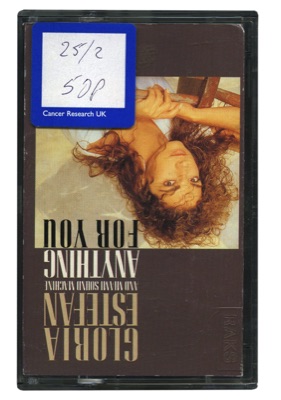Learning to Live
Creativity, money and love
I Give You Everything (Lisa Stansfield)
In 2009 I spent some time hanging around the charity shops of Cupar, a small market town located right in the middle of the Kingdom of Fife. Cupar is a town that still just about functions, with a selection of small shops and food outlets, minor parking problems, my dentist, a fine baker and seven charity shops. It also has a further education college that teaches golf studies and an interesting annual arts festival, as well as being the constituency base of MP and athlete Menzies Campbell.
Give It Up (Gloria Estefan)
For three months I browsed the shelves of these charity shops in an attempt to buy up all the second-hand music CDs which contained songs that related to a theme of 'giving'. Amongst all of the Blue and S Club 7 back catalogue that provides the basic stock of these shops I eventually managed to find enough songs to fill a compilation which was lovingly re-mastered as a new CD entitled 'I Give You Everything'.
Some Gave All (Billy Ray Cyrus)
Containing 10 tracks, this compilation CD was produced in a limited edition of 7, and packaged alongside a signed unique print I had made (based on the images from the CD covers I had purchased) and framed for display. These editions were then donated back to the charity shops who were then free to sell them (or exchange them) for whatever value they felt appropriate.
You Give Me Something (Jamiroquai)
As an art project it was perhaps unspectacular, but as an attempt to express some frustration around the inarticulate notions of value that inform our everyday transactions it had more success (for me anyway). Songs about love, freely given, sold once, then given with charitable intent to be re-sold at a lesser value, before receiving the magic fairy dust of artistic intent in order to render them more valuable, possibly more valuable (hopefully) than their original product price. Perhaps it was ultimately little more than an attempt to render some value from the vanity of artistic intent through a proper high street retail experience.
Give Me Life (Daniel Powter)
As a wise man once told me, economics is the translation of value from one location to another. That it is the transfer of alienable significance from one owner to another owner as part of a trade. It is not the movement of money to create more money. That is usury – a practice that is a sin according to most major religions and was pretty much illegal in England until 1545. It used to invite capital punishment in the former Soviet Union and in the Divine Comedy Dante places the usurers in the seventh circle of hell alongside the blasphemers.
Give It To Me (Kylie Minogue)
Talking to others about this led me to find out that what I was beginning to gain was effectively a Marxist perspective. That a deep and rich philosophical vein already existed in which all these ideas were laid out to form a set of conclusions that – although robust - had been stained deeply by the reactionary popular politics of my youth – and that I was probably out of my depth in attempting to rationalise this project.
I Have to Give You Back Your Freedom (Nicole)
My own specific drama in this instance being a performance of the value of the magic spell that an artist casts on the basest material – or in this case a Kylie Minogue song – to make it somehow different – and specifically, more expensive. And perhaps more significantly, what are the limits to this mystical power, when the supply of cultural value is apparently inexhaustible (unlike more conventional resources).
What U Give U Get Back (Scorpions)
Clearly the charity shops of Cupar were not going to severely challenge Christies for setting the standards for the accretion of monetary value through artistic action, but it seemed like a good idea at the time. It, at least made me feel like I was testing an ethic which appeared to me to be occluded by the euphoric sense of capital wealth that was increasingly being celebrated within a field of activity that I had believed to be answerable to higher gods. That by tricking an object into believing it now possessed the boundless inalienable value of cultural experience, it could somehow be owned for a higher financial value.
I Can't Give You Anything But Love (Peggy Lee)
Still, all the editions were sold (or traded) and some people told me they had bought them, although I never asked the shops how much they got for them. That might have dented my own deeply valued sense of moral superiority.
Give Me Back My Heart (Dollar)
Clive Gillman 2011
